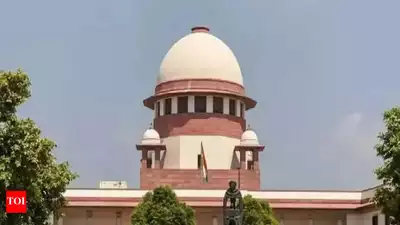
NEW DELHI: Holding that right to freedom of speech and expression was an integral part of a healthy and civilised society, without which it was impossible to lead a dignified life, Supreme Court on Friday said the right of citizens to express themselves could not be trampled upon on “flimsy and fanciful grounds”. The court quashed criminal proceedings initiated by Gujarat Police against Congress MP Imran Pratapgarhi over his social media post with a poem, ‘Ae khoon ke pyase baat suno’. Creating another layer of protection to prevent harassment by the government or police because of spoken or written words, or by signs or visible representations and also to ensure artistic freedom, a bench of Justices Abhay S Oka and Ujjal Bhuyan said FIR should not be lodged blindly in a mechanical way.
A preliminary inquiry should be conducted by the police to ascertain whether a prima facie case was made out or not under various provisions of Bharatiya Nyaya Sanhita, including Sections 196 and 197(1). Setting standards for assessing the impact of spoken and written words, the bench said, “When an offence punishable under Section 196 of BNS is alleged, the effect of the spoken or written words will have to be considered based on standards of reasonable, strong-minded, firm and courageous individuals and not based on the standards of people with weak and oscillating minds. The effect of the spoken or written words cannot be judged on the basis of the standards of people who always have a sense of insecurity or of those who always perceive criticism as a threat to their power or position.

” Court must zealously protect rights of citizens, including right to express: SC New Delhi: Seventy-five years into our republic, we cannot be seen to be so shaky on our fundamentals that mere recital of a poem or, for that matter, any form of art or entertainment, such as stand-up comedy, can be alleged to lead to animosity or hatred amongst different communities,” Supreme Court said on Friday while exhorting the judiciary to be at the forefront to “zealously protect” the fundamental rights of citizens, including the right to speak and express themselves which it said was not honoured by the police and the executive in many cases. A bench of Justices Abhay S Oka and Ujjal Bhuyan frowned upon Gujarat high court for not quashing criminal proceedings against Congress MP Imran Pratapgarhi for his poem which the court said talked about “love, non-violence and fighting against injustice”. The bench rejected the HC’s justification that it did not interfere as the probe was at an initial stage.
“Courts, particularly constitutional courts, must be at the forefront to zealously protect the fundamental rights of citizens. It is the bounden duty of courts to ensure that the Constitution and the ideals of the Constitution are not trampled upon. Endeavour of the courts should always be to protect and promote fundamental rights, including the right to freedom of speech and expression, which is one of the most cherished rights a citizen can have in a liberal constitutional democracy.
Courts must not be seen to regulate or stifle freedom of speech and expression. As a matter of fact, courts must remain ever vigilant to thwart any attempt to undermine the Constitution and constitutional values, including freedom of speech and expression,” the bench said. “In a healthy democracy, the views, opinions or thoughts expressed by an individual or group of individuals must be countered by expressing another point of view.
Even if a large number of persons dislike the views expressed by another, the right of the person to express the views must be respected and protected. Literature, including poetry, dramas, films, stage shows including stand-up comedy, satire and art, make the lives of human beings more meaningful. Courts are duty-bound to uphold and enforce fundamental rights guaranteed under the Constitution.
Sometimes, we, the judges, may not like spoken or written words. But still, it is our duty to uphold the fundamental right under Article 19(1)(a). We judges are under an obligation to uphold the Constitution and respect its ideals.
If the police or executive fail to honour and protect the fundamental rights guaranteed under Article 19(1)(a) of the Constitution, it is the duty of the courts to step in and protect the fundamental rights. There is no other institution which can uphold the fundamental rights of citizens,” the bench said. It said there was no rule that when the investigation was at a nascent stage, the HC could not exercise its jurisdiction to quash an offence.
“When the high court, in the given case, finds that no offence was made out on the face of it, to prevent abuse of the process of law, it can always interfere even though the investigation is at the nascent stage. There is no such blanket rule putting an embargo on the powers of the high court to quash FIR only on the ground that the investigation was at a nascent stage,” it added. Stay updated with the latest India news , weather , and Air Quality Index (AQI) updates for major cities like Delhi , Mumbai , Noida , and Bangalore on Times of India .
.















